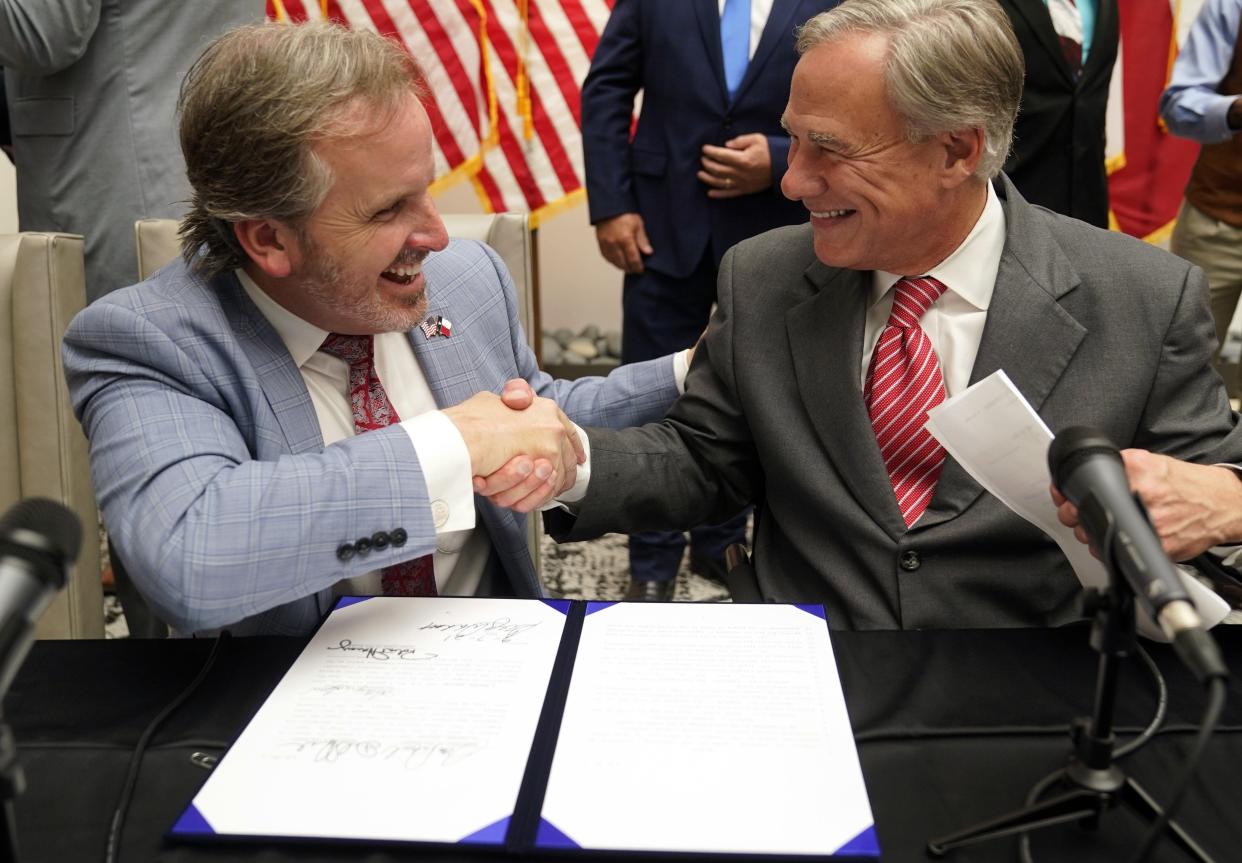Federal judge blocks new Texas law limiting vote-by-mail applications

- Oops!Something went wrong.Please try again later.
- Oops!Something went wrong.Please try again later.
A federal judge has blocked a new Texas law that makes it a crime for election officials to send a vote-by-mail application to registered voters who hadn't asked for one.
U.S. District Judge Xavier Rodriguez of San Antonio said the prohibition, part of a sweeping Republican-led elections and voting law known as Senate Bill 1, constitutes unlawful viewpoint discrimination in violation of First Amendment protections.
"The State of Texas has no power to restrict expression because of its message, its ideas, its subject matter, or its content," Rodriguez wrote in his order, which granted a requested preliminary injunction that barred enforcement of the anti-solicitation provision.
Texas Attorney General Ken Paxton is expected to appeal the Friday night ruling.
Isabel Longoria, Harris County's elections administrator, and Cathy Morgan, a volunteer deputy registrar in Travis and Williamson counties, sued in December to block the provision, arguing that it violated free speech rights and hampered their abilities to help voters cast a ballot.
The provision makes it a state jail felony for election officials to encourage people to apply to vote by mail. Instead, officials are required to wait until voters request applications.
Since SB 1 took effect Dec. 2, violations have carried a jail sentence of six months to two years and a fine of up to $10,000. Violators also could be subject to civil enforcement by Paxton, with penalties that include firing and the loss of employment benefits.
In his order, Rodriguez said the ban on solicitation violates free speech rights of Longoria and Morgan because it improperly prohibits expression based on the content of what is being said.
An official who encourages voters to request a vote-by-mail application can be hit with criminal and civil penalties, the judge noted. "If the speech is about a different topic, they do not," Rodriguez wrote.
"As it stands, speech encouraging or requesting the submission of an application to vote by mail is a crime. Discouraging the submission of an application to vote by mail, on the other hand, is not," the judge added.
Candidates, campaigns and political parties are not included in the solicitation ban.
Harris County Attorney Christian Menefee, whose office helped challenge the solicitation provision, called the ruling a fantastic result that will help voters in Harris, Travis and Williamson counties.
"Public officials should be able to recommend (mail-in ballots) for folks who are eligible to vote by mail. SB 1 is about keeping these voters in the dark and discouraging them from voting by mail," he said.
The challengers asked the judge to rule no later than Monday, noting that to cast a mail-in ballot in the March 1 primaries, voters must fill out and return an application by Feb. 18.
Rodriguez, who made his ruling Friday night after a hearing on the matter earlier in the day, was appointed to the federal bench in 2003 by President George W. Bush, the former Texas governor.
Republicans pushed to limit the distribution of unsolicited vote-by-mail applications after Harris County's Democratic clerk planned to send applications to more than 2 million registered voters before the November 2020 election.
Then-County Clerk Chris Hollins said the distribution was intended as a convenience that would improve voter participation, particularly during a dangerous pandemic.
But Republicans, who argue that mail-in ballots are less secure than in-person voting, said the move would encourage ineligible voters to improperly cast absentee ballots. Texas law limits mail-in voting to those who are 65 and older, sick or disabled, out of the county during the election period or confined in jail but otherwise eligible to vote.
After Paxton sued to block Hollins' plan, the Texas Supreme Court ruled that state law did not give the clerk the authority to mass mail the applications.
GOP lawmakers followed by specifying, in SB 1, that election officials cannot "solicit the submission of an application to vote by mail from a person who did not request an application."
In his order, Rodriguez rejected Paxton's argument that the solicitation ban targets government speech, which isn't protected by the First Amendment because the state is allowed to regulate how public employees perform official duties.
But, the judge noted, Longoria and Morgan do not work for the state. Longoria is employed by Harris County, and Morgan is a volunteer registrar.
Rodriguez also rejected Paxton's claim that granting the injunction would interfere with the orderly operation of Texas elections. The judge said his order does not affect any voting procedures, change the vote-by-mail process, or affect voting deadlines or eligibility.
"Nor does it require that election officials start soliciting applications to vote by mail — it simply prevents the imposition of criminal and civil penalties against officials for encouraging people to vote by mail if they are eligible to do so," Rodriguez wrote.
This article originally appeared on Austin American-Statesman: Texas voting law limiting vote-by-mail applications blocked by judge

